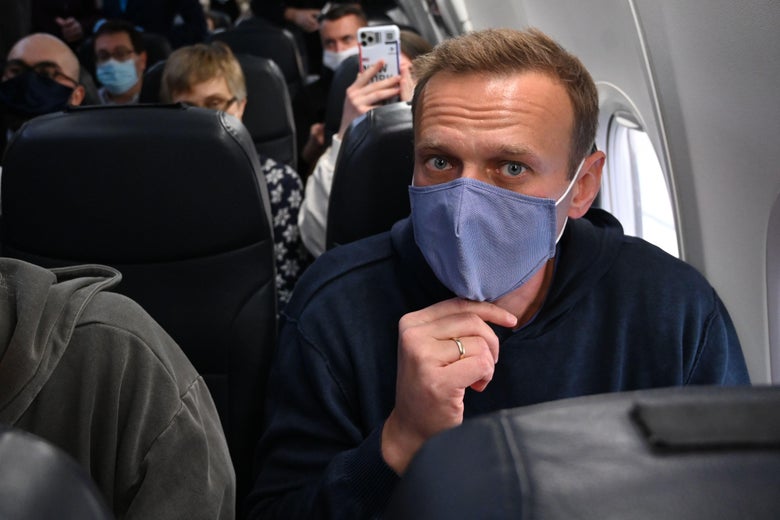
In terms of sheer courage, few political figures anywhere in the world are a match for the imprisoned Russian opposition leader Alexei Navalny, who, after being nearly killed early this year, has set himself on what appears to be an irreversible collision course with President Vladimir Putin. Navalny seems unlikely to prevail, but he is still testing the Russian president at a moment when he’s more vulnerable than he’s been in years. We may see just how vulnerable the president feels this weekend.
Navalny first gained renown as a blogger, publishing exposés of the corruption and illicit wealth of senior Russian officials. In recent years, he has become an influential protest leader, despite multiple stints in prison, and ran unsuccessfully for president in 2018. In August, Navalny was poisoned while boarding a flight in the Siberian city of Novosibirsk, and evacuated to Germany for medical treatment—including a medically induced coma. German authorities say he was poisoned with Novichok, the nerve agent also used in the attempted assassination of former Russian spy Sergei Skripal and his daughter in England in 2018.* An investigation by CNN and the investigative site Bellingcat identified the agents of Russia’s FSB security service who had been tailing Navalny. Navalny himself produced a tape of one of the agents discussing how they applied the toxin to Navalny’s underwear. Putin has acknowledged that Navalny was being followed but denied that the FSB poisoned him, saying, “If [we] wanted to poison him, [we’d] have finished the job.”
If the Kremlin’s hope was that Navalny would stay away from Russia after his near-death experience, it didn’t work. Navalny flew home to Moscow last weekend, despite the Russian government making it very clear that he would be arrested when he landed. Navalny was taken into custody on Sunday and charged with violating the parole terms of his suspended sentence from a 2014 embezzlement conviction. He could face up to 2½ years in prison.
Two days into his detention, Navalny and his allies countered by releasing a two-hour video accusing Putin of massive corruption. The video includes drone footage of the $1.4 billion palace on the Black Sea that was allegedly built by Putin using a slush fund. It also includes footage of a teenager alleged to be Putin’s unacknowledged daughter from an extramarital affair. The video has been watched more than 53 million times.
Now, nationwide protests demanding Navalny’s release are planned for tomorrow. Authorities are already clamping down on the planned marches. Senior Navalny associates have been arrested, and the country’s largest social network, VKontakte, has blocked pages for the rallies. Turnout is still expected to be big.
Back in 2013, Navalny was unexpectedly released from prison after thousands of his supporters marched on the Kremlin. This time, he may not be so lucky. Navalny has been a uniquely persistent and irritating thorn in the Russian government’s side. His social media savvy has allowed him to circumvent official censorship. His exposés have hit Putin’s inner circle where it hurts: their wallets. And pugnacious, nationalist appeal extends beyond traditional liberals in Moscow and St. Petersburg. When Navalny was poisoned, he had been in Siberia to campaign for local candidates opposing Putin’s United Russia party, and those efforts paid off during regional elections in September.
Putin pointedly refuses to say Navalny’s name in public, but it’s safe to say he thinks about him more than he’d like to. Putin has weathered rounds of protest before, and there’s every indication he will weather this one just fine. According to the generally respected Levada Center polling agency, Putin’s approval rating is around 65 percent, which is relatively low for him but most world leaders would take it. There’s little threat to his control of the country’s mainstream media or its security forces.
Still, there are a few troubling indicators for the president as he enters his third decade in power. Russia’s neighbors are experiencing instability, including the overthrow of the government in Kyrgyzstan, a bloody war in the fall between Armenia and Azerbaijan, and protests in Belarus that are still going on five months after a disputed election. All this suggests Russia’s ability to project power in its “near abroad” may not be what it was. The government’s response to the COVID crisis has been haphazard and repressive. Both the pandemic and oil prices have hit the economy hard.
Then there’s the change in Washington. Whatever his personal feelings or interests, Donald Trump, in practice, was never quite the Putin lapdog he was often caricatured as; his administration put tough new sanctions on Russian officials and sold previously off-limits weapons systems to Ukraine. But the last four years of chaos in the U.S. were still beneficial to the Russian government in terms of both strategic priorities and public relations. (Lectures about democracy and the rule of law from Washington ring a bit more hollow now.) Joe Biden is a longtime Russia hawk and, according to the Washington Post, has already reportedly tasked intelligence officials with investigating Russian election interference, the recent SolarWinds hack, the reported payment of bounties on U.S. troops in Afghanistan, and the poisoning on Navalny. Newly minted national security adviser Jake Sullivan tweeted to demand Navalny’s release shortly after his arrest.
While Biden has vowed to stand up to Putin, his administration also has a number of areas where it’s looking for cooperation from the Kremlin. One immediate priority is an extension of the New START arms control treaty, which, thanks to the Trump team’s disinterest, is set to expire in February. But depending on how events turn out on the streets of Russia’s cities this weekend, the new U.S. administration may have a more immediate concern to respond to.
Correction, Jan. 22: This article originally misstated that Sergei Skripal’s wife was poisoned in 2018. It was his daughter.
https://ift.tt/3iARVQm
World
Bagikan Berita Ini














0 Response to "Poison and Prison Haven’t Stopped Putin’s Most Determined Foe - Slate"
Post a Comment